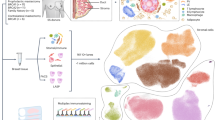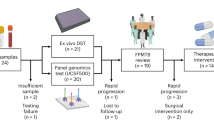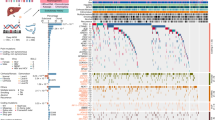Abstract
Mutations in BRCA1 and/or BRCA2 (BRCA1/2) are the most common indication of deficiency in the homologous recombination (HR) DNA repair pathway. However, recent genome-wide analyses have shown that the same pattern of mutations found in BRCA1/2-mutant tumors is also present in several other tumors. Here, we present a new computational tool called Signature Multivariate Analysis (SigMA), which can be used to accurately detect the mutational signature associated with HR deficiency from targeted gene panels. Whereas previous methods require whole-genome or whole-exome data, our method detects the HR-deficiency signature even from low mutation counts, by using a likelihood-based measure combined with machine-learning techniques. Cell lines that we identify as HR deficient show a significant response to poly (ADP-ribose) polymerase (PARP) inhibitors; patients with ovarian cancer whom we found to be HR deficient show a significantly longer overall survival with platinum regimens. By enabling panel-based identification of mutational signatures, our method substantially increases the number of patients that may be considered for treatments targeting HR deficiency.
This is a preview of subscription content, access via your institution
Access options
Access Nature and 54 other Nature Portfolio journals
Get Nature+, our best-value online-access subscription
$29.99 / 30 days
cancel any time
Subscribe to this journal
Receive 12 print issues and online access
$209.00 per year
only $17.42 per issue
Buy this article
- Purchase on Springer Link
- Instant access to full article PDF
Prices may be subject to local taxes which are calculated during checkout





Similar content being viewed by others
Data availability
Detailed information on how to access the ICGC, TCGA, CCLE and GDSC data for the cell lines can be found in the Methods. Information about the ICGC and TCGA can be found at https://icgc.org/ and http://cancergenome.nih.gov, respectively All other remaining data are available within the article and in the Supplementary Data, or available from the authors upon request.
Code availability
The code for SigMA is available on GitHub (https://github.com/parklab/SigMA) as an R package.
References
Nik-Zainal, S. et al. Mutational processes molding the genomes of 21 breast cancers. Cell 149, 979–993 (2012).
Alexandrov, L. B. et al. Signatures of mutational processes in human cancer. Nature 500, 415–421 (2013).
Alexandrov, L. B., Nik-Zainal, S., Wedge, D. C., Campbell, P. J. & Stratton, M. R. Deciphering signatures of mutational processes operative in human cancer. Cell Rep. 3, 246–259 (2013).
Alexandrov, L. et al. The repertoire of mutational signatures in human cancer. Preprint at https://doi.org/10.1101/322859 (2018).
Burns, M. B. et al. APOBEC3B is an enzymatic source of mutation in breast cancer. Nature 494, 366–370 (2013).
Drost, J. et al. Use of CRISPR-modified human stem cell organoids to study the origin of mutational signatures in cancer. Science 358, 234–238 (2017).
Fedeles, B. I., Chawanthayatham, S., Croy, R. G., Wogan, G. N. & Essigmann, J. M. Early detection of the aflatoxin B1 mutational fingerprint: a diagnostic tool for liver cancer. Mol. Cell. Oncol. 4, e1329693 (2017).
Haradhvala, N. J. et al. Distinct mutational signatures characterize concurrent loss of polymerase proofreading and mismatch repair. Nat. Commun. 9, 1746 (2018).
Meier, B. et al. Mutational signatures of DNA mismatch repair deficiency in C. elegans and human cancers. Genome Res. 28, 666–675 (2018).
Nik-Zainal, S. et al. The genome as a record of environmental exposure. Mutagenesis 30, 763–770 (2015).
Ohno, M. et al. 8-oxoguanine causes spontaneous de novo germline mutations in mice. Sci. Rep. 4, 4689 (2014).
Zou, X. et al. Validating the concept of mutational signatures with isogenic cell models. Nat. Commun. 9, 1744 (2018).
Nik-Zainal, S. et al. Landscape of somatic mutations in 560 breast cancer whole-genome sequences. Nature 534, 47–54 (2016).
Davies, H. et al. HRDetect is a predictor of BRCA1 and BRCA2 deficiency based on mutational signatures. Nat. Med. 23, 517–525 (2017).
Polak, P. et al. A mutational signature reveals alterations underlying deficient homologous recombination repair in breast cancer. Nat. Genet. 49, 1476–1486 (2017).
Zámborszky, J. et al. Loss of BRCA1 or BRCA2 markedly increases the rate of base substitution mutagenesis and has distinct effects on genomic deletions. Oncogene 36, 746–755 (2017).
Northcott, P. A. et al. The whole-genome landscape of medulloblastoma subtypes. Nature 547, 311–317 (2017).
Sachs, N. et al. A living biobank of breast cancer organoids captures disease heterogeneity. Cell 172, 373–386.e10 (2018).
Zehir, A. et al. Mutational landscape of metastatic cancer revealed from prospective clinical sequencing of 10,000 patients. Nat. Med. 23, 703–713 (2017).
Blokzijl, F., Janssen, R., van Boxtel, R. & Cuppen, E. MutationalPatterns: comprehensive genome-wide analysis of mutational processes. Genome Med. 10, 33 (2018).
Gehring, J. S., Fischer, B., Lawrence, M. & Huber, W. SomaticSignatures: inferring mutational signatures from single-nucleotide variants. Bioinformatics 31, 3673–3675 (2015).
Rosenthal, R., McGranahan, N., Herrero, J., Taylor, B. S. & Swanton, C. deconstructSigs: delineating mutational processes in single tumors distinguishes DNA repair deficiencies and patterns of carcinoma evolution. Genome Biol. 17, 31 (2016).
Kazanov, M. D. et al. APOBEC-induced cancer mutations are uniquely enriched in early-replicating, gene-dense, and active chromatin regions. Cell Rep. 13, 1103–1109 (2015).
Alexandrov, L. B. et al. Clock-like mutational processes in human somatic cells. Nat. Genet. 47, 1402–1407 (2015).
Frampton, G. M. et al. Development and validation of a clinical cancer genomic profiling test based on massively parallel DNA sequencing. Nat. Biotechnol. 31, 1023–1031 (2013).
Gorthi, A. et al. EWS-FLI1 increases transcription to cause R-loops and block BRCA1 repair in Ewing sarcoma. Nature 555, 387–391 (2018).
Abkevich, V. et al. Patterns of genomic loss of heterozygosity predict homologous recombination repair defects in epithelial ovarian cancer. Br. J. Cancer 107, 1776–1782 (2012).
Fraser, M. et al. Genomic hallmarks of localized, non-indolent prostate cancer. Nature 541, 359–364 (2017).
Ledermann, J. et al. Olaparib maintenance therapy in platinum-sensitive relapsed ovarian cancer. N. Engl. J. Med. 366, 1382–1392 (2012).
Waddell, N. et al. Whole genomes redefine the mutational landscape of pancreatic cancer. Nature 518, 495–501 (2015).
Wu, Y.-M. et al. Inactivation of CDK12 delineates a distinct immunogenic class of advanced prostate cancer. Cell 173, 1770–1782.e14 (2018).
Yang, W. et al. Genomics of Drug Sensitivity in Cancer (GDSC): a resource for therapeutic biomarker discovery in cancer cells. Nucleic Acids Res. 41, D955–D961 (2013).
Basu, A. et al. An interactive resource to identify cancer genetic and lineage dependencies targeted by small molecules. Cell 154, 1151–1161 (2013).
Alsop, K. et al. BRCA mutation frequency and patterns of treatment response in BRCA mutation-positive women with ovarian cancer: a report from the Australian Ovarian Cancer Study Group. J. Clin. Oncol. 30, 2654–2663 (2012).
Siegel, R. L., Miller, K. D. & Jemal, A. Cancer statistics, 2018. CA Cancer J. Clin. 68, 7–30 (2018).
Roy, R., Chun, J. & Powell, S. N. BRCA1 and BRCA2: different roles in a common pathway of genome protection. Nat. Rev. Cancer 12, 68–78 (2012).
Mirza, M. R. et al. Niraparib maintenance therapy in platinum-sensitive, recurrent ovarian cancer. N. Engl. J. Med. 375, 2154–2164 (2016).
Telli, M. L. et al. Homologous-recombination deficiency (HRD) score predicts response to platinum-containing neoadjuvant chemotherapy in patients with triple-negative breast cancer. Clin. Cancer Res. 22, 3764–3773 (2016).
Talevich, E., Shain, A. H., Botton, T. & Bastian, B. C. CNVkit: genome-wide copy number detection and visualization from targeted DNA sequencing. PLoS Comput. Biol. 12, e1004873 (2016).
Vilar Sanchez, E. et al. Preclinical testing of the PARP inhibitor ABT-888 in microsatellite instable colorectal cancer. J. Clin. Oncol. 27, 11028 (2009).
Acknowledgements
This work was mainly supported by the Ludwig Center at Harvard. I.C.C. received funding from the European Union (Marie Curie Skłodowska-Curie grant no. 703543). We would like to thank S. Elledge, G. Wulf, J. Dry and Z. Lai for helpful discussions, A. Galor and J. Cook for careful reading of the manuscript and S. Ouellette for help with the website.
Author information
Authors and Affiliations
Contributions
D.C.G. and J.J.K.L. conceived the project. P.J.P. supervised the project. D.C.G. developed the algorithm, with suggestions and assistance from G.E.M.M., J.J.K.L. and I.C.C. In particular, G.E.M.M. helped with the simulation studies, J.J.K.L. suggested the application of signature analysis to PARP inhibitors and I.C.C. suggested the analysis of cell line/drug response data. D.C.G. and P.J.P. wrote the manuscript with input from all other authors.
Corresponding author
Ethics declarations
Competing interests
The authors declare no competing interests.
Additional information
Publisher’s note: Springer Nature remains neutral with regard to jurisdictional claims in published maps and institutional affiliations.
Supplementary information
Supplementary Information
Supplementary Methods and Supplementary Figures 1–27
Supplementary Table 1
Predicted labels for MSK-IMPACT panels
Supplementary Table 2
MVA classification.
Rights and permissions
About this article
Cite this article
Gulhan, D.C., Lee, J.JK., Melloni, G.E.M. et al. Detecting the mutational signature of homologous recombination deficiency in clinical samples. Nat Genet 51, 912–919 (2019). https://doi.org/10.1038/s41588-019-0390-2
Received:
Accepted:
Published:
Issue Date:
DOI: https://doi.org/10.1038/s41588-019-0390-2
This article is cited by
-
A novel targeted NGS panel identifies numerous homologous recombination deficiency (HRD)-associated gene mutations in addition to known BRCA mutations
Diagnostic Pathology (2024)
-
Homologous Recombination Deficiency Unrelated to Platinum and PARP Inhibitor Response in Cell Line Libraries
Scientific Data (2024)
-
Accurate and sensitive mutational signature analysis with MuSiCal
Nature Genetics (2024)
-
Evaluation of Homologous Recombination Deficiency in Ovarian Cancer
Current Treatment Options in Oncology (2024)
-
Dual-loss of PBRM1 and RAD51 identifies hyper-sensitive subset patients to immunotherapy in clear cell renal cell carcinoma
Cancer Immunology, Immunotherapy (2024)



